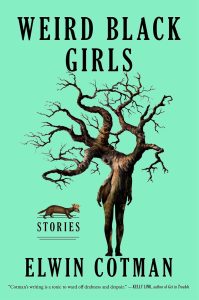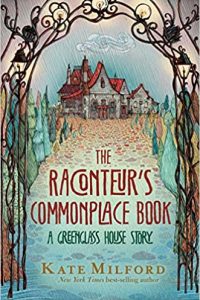Jake Casella Brookins Reviews Weird Black Girls by Elwin Cotman
 Weird Black Girls, Elwin Cotman (Scribner 978-1-66801-885-9, 330pp, $17.99, tp) April 2024. Cover by Michael Morris.
Weird Black Girls, Elwin Cotman (Scribner 978-1-66801-885-9, 330pp, $17.99, tp) April 2024. Cover by Michael Morris.
There are plenty of speculative elements in Elwin Cotman’s newest collection, Weird Black Girls, but his skill at evoking people and situations makes even the nonfantastic entries utterly spellbinding. In “Owen”, for example, a father attempts to bond with his son through a ritual funeral for wrestler Owen Hart, with a kind of hauntingly unstated insecurity throughout, while “Triggered” is an astonishing character study of protestors in the Occupy movement, one of whom exerts a powerful and ultimately destructive influence on the narrator. Cotman’s stories have an organic sense of timing and detail, with brilliant dialogue and narrative voice, which makes the more shocking scenes hit all the harder. The realism here is bracing.
In other stories in the collection, though, Cotman centers the fantastic to sublime effect. Weird Black Girls’s opening story, “The Switchin’ Tree”, is jaw-droppingly good: a deep Southern swamp horror that pairs cosmic terror from beyond with the daily terrors of racist American society (the Confederate flag makes an appearance as “that inbred X of death”). Tonally, it makes a nice pairing with P. Djèlí Clark’s Ring Shout, and it’s equally remarkable for the grotesqueries of the titular tree (“mesmerizing in its hideousness”) and the story’s ambiguity about the tree’s causal relation to human cruelty – like “Owen”, corporal punishment of children is a central topic. Most astonishing, however, is the story’s voice: “The Switchin’ Tree” is a child’s story, but related later, and its organic dialect and evocative wordplay makes it feel deeper than a fable.
Far lighter in some ways, but just as good at blending the deeply real and the vividly imaginative, is “Tournament Arc”, in which a pair of middle-aged anime enthusiasts run a LARP at a local convention. Things take a surreal turn when increasingly bizarre entities appear to compete, beginning with an animated suit of 16th-century Nigerian armor, and Cotman turns it into an amazing tightrope-act of a story, balancing outlandish science fiction and fantasy tropes with meditations on fan culture and intersectional identity (“as a child, I never saw myself in the stories I loved”), COVID and police-state realities, and anchoring it all in a deadpan but deeply felt friendship.
There are a few places where the fabulist and more human-centric elements don’t quite connect. “Reunion”, for instance, features both a rivetingly brittle conversation between old friends – rife with cultural insight, tension sexual and otherwise, and defensive retreats – and increasingly surreal imagery that feels like more of a thematic parallel than an intersection. Elsewhere, though, Cotman’s gifts for character and the imaginary are mutually reinforcing: “Things I Never Learned in Caitlin Clarke’s Intro to Acting Class”, for example, is a tour de force. The core of the story is about two young men starting a relationship, and the first-person narrator is astonishing and entertaining – flamboyant, witty, slowly revealing hidden depths and complexity. The magical element acts as an emotional force multiplier: Every time he touches his new crush, Leroy, he’s transported back to Leroy’s memories of his time studying acting under Caitlin Clarke (of Dragonslayer fame). It’s a bit like Being John Malkovich for its weirdly potent submersion in someone else’s head, a bit like Groundhog Day for its fantasy of perfection through repetition, but really it’s its own thing, thinking about gay Black cultural relations to iconic white women, pondering the tragicomic potential of youth from a slightly older vantage, and infused with a painfully earnest longing for completeness: “There has to be a way we can jump over our chaotic selves to the part where we work it out. To melt the small grievances in the heat of greater truth, and, having accomplished that be as one.”
A quality in collections and anthologies that I really appreciate is pacing, timing – a sense for how things will land with the reader, and what they’ll be feeling as they close the book. (As with album arrangement, one wonders if it’s become something of an afterthought in our digital age.) After such a varied and engaging set of stories, Weird Black Girls closes triumphantly, with the masterpiece that is its title story. “Weird Black Girls”, once more, features a wonderfully engaging narrator, here on a trip to Boston with a potential girlfriend, and the skill with which Cotman captures their awkwardness and complexity is phenomenal. And behind (and below, and around) them is a strange vision of Boston, one which was catapulted miles into the sky by a poorly understood “Rupture” in 1702, where strange creatures and centuries-old witches walk the streets, where oxygen masks are needed to tour Cambridge. It’s strange and amazing, but it’s also, for these characters, a real thing in the real world. They accept it, they kind of move past it – except when it jumps out, when some confluence of forces lets them see these wonders with fresh eyes. Cotman manages to conjure a new weird city, and also let us see the weirdness of real cities, any city, the way historical accident and atrocity and serendipity come together – and then people live there. I find myself despairing trying to capture everything going on in just this story, much less the collection as a whole. This is not one to miss.
Jake Casella Brookins is from the Pennsylvania Appalachians, and spent a fantastic amount of time in the woods. He studied biology, before switching over to philosophy & literature, at Mansfield University. He’s been a specialty coffee professional since 2006. He’s worn a lot of coffee hats. He worked in Upstate New York and Ontario for about 8 years. He’s been in Chicago since 2013; prior to the pandemic, he worked for Intelligentsia Coffee in the Loop. Starting in 2021, he’s been selling books at a local indie bookstore. He lives with his wife, Alison, and their dogs Tiptree & Jo, in Logan Square.
This review and more like it in the July 2024 issue of Locus.
 While you are here, please take a moment to support Locus with a one-time or recurring donation. We rely on reader donations to keep the magazine and site going, and would like to keep the site paywall free, but WE NEED YOUR FINANCIAL SUPPORT to continue quality coverage of the science fiction and fantasy field.
While you are here, please take a moment to support Locus with a one-time or recurring donation. We rely on reader donations to keep the magazine and site going, and would like to keep the site paywall free, but WE NEED YOUR FINANCIAL SUPPORT to continue quality coverage of the science fiction and fantasy field.
©Locus Magazine. Copyrighted material may not be republished without permission of LSFF.







